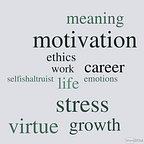200 Hours to learn a skill
In his book, Outliers — The story of success, Malcolm Gladwell claims that it takes 10,000 hours of right kind of practice to become the world’s best at something. 10,000 hours is a lot of time. If you put one hour a day, it will take you almost three decades to complete 10,000 hours. It’s not just about putting the hours. Almost all of us put more than 10,000 hours at our jobs, and yet, we don’t become world’s best at it. This is because at our jobs, most of our time is spent doing mundane, grungy and repetitive things. We have to put the time really learning the right things if we want to become the best. While the idea of 10,000 hours is great and motivating, for most people, it is not very practical.
There is another way to think about growth. Let’s call it the 200 hours way. My claim is that it may take as little as 200 hours to go from not knowing anything to becoming good enough at a new skill to start applying it to your profession and incrementally advance in your career. Most professions are evolving rapidly these days. Skills and knowledge become irrelevant every few years. Also, as you grow up the ladder, in most professions, you have to end up doing a very different job and the skills from the previous roles don’t necessarily carry forward to help you in your next role. The need for constantly learning and evolving skills is more critical today than ever before.
Over the last few years, I have been challenging myself to try out new things. I have tried to learn guitar, magic, dancing, blogging, angel investing and more, all, starting from scratch. Professionally, in the last few years, I have tried my hands at learning deep learning, strategic thinking and senior leadership.
In almost all cases, the time I invested on skill development was limited to a few hours per week. I started by setting a very low bar for myself. As I found myself making progress against that low bar. Good teachers / learning material matter — they break down a complex task into smaller simpler tasks and sequence them in the right way. They shield us from the vast amount of information out there of everything you could be learning to ensure that you stay focused. Learning to learn is a skill in itself. I feel that learning guitar is not that different from learning deep learning at the level of how human brain works. Below is a video of my progress in learning to create a wave with hands with just 10 days of practice. I had put about 5 mins on this every day.
When I started learning guitar, my instructor taught me basic chords and strumming pattern for a song. With several weeks of practice, I was able to play the song but I was playing it slow and with lot of errors. When my instructor told me that we will now pick the next song and next set of concepts, I told him that I am still unhappy with the way I am playing the previous song. He said that just because you are going to pick the next song should not stop you from continuing to practice the old one. He told that people practice the same song over and over for years altogether, each time, adding some new element to it as their skills evolve. He said, ‘Don’t let the desire to be best be the enemy of being good-enough’. You have to keep moving forward to learn new concepts even if you have not yet mastered the previous ones — that is the only way to learn anything.
While in comparison to 10,000 hours, 200 hours seems like nothing, the fact is that 200 hours is not trivial. If you give something an hour every day, leaving aside weekends and holidays, you will need a year to complete 200 hours. If you really put this amount of time in a dedicated manner under the guidance of the right teacher or learning material, it will make a difference. You may not become an expert, but you will be able to say that you know it. I believe that this will be sufficient investment to go from not knowing something at all to knowing enough such that you can start putting it to practice professionally or in personal life.
Based on my experience as a leader, my assessment is that most people who stop growing in career stop growing because they stop putting their mind to learning new things. There are very few Sachin Tendulkars, Roger Federers, Steve Jobs and Stephen Hawkins in this world. But, there are a lot of good leaders, managers, engineers, doctors, writers and painters who are living a successful and happy life. In the profession of your choice, you can keep growing and creating a bigger impact by identifying the skills you need to grow, finding a coach and putting 200 hours to break the entry barrier, one step at a time.
